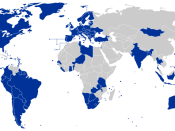INTRODUCTION
The world is shrinking - or so it seems. Governments are quite possibly more interconnected and interrelated now than at any other time in history. This web of interdependency is primarily made possible by trade. And while some argue that free trade is mutually beneficial to all parties, critics of globalization say that, among other things, centralized trade organizations and non-governmental organizations threaten states' sovereignty. More succinctly: Political sovereignty is threatened by global organizations that regulate worldwide trade.
Ultimately the critic's argument is based upon the perception that free trade is capitalism run amok. It invites developing nations into its circle of commerce only to exploit that nation by imposing heavy tariffs upon its exports and limiting its production by imposing unrealistic environmental standards. Moreover, critics see international organizations that regulate trade as threatening the authority of a state's sovereign will by the imposition of democratic values upon a society unable to financially or culturally support them.
IS GLOBALIZATION REALLY HURTING?
Over the past decade, developing countries have consistently outperformed industrialized countries in terms of export growth - an average increase of almost 10 percent a year, compared to 5 percent for industrialized countries. And trade among developing countries is growing more quickly than trade with the industrialized North.
According to Global economic trends and prospects, during the year 2000, "the exports of developing countries increased by 15 percent - three times as much as their GDP growth which is the best in five decades".
As a whole, developing countries have profited from the successive multilateral rounds of trade negotiations. Their share in world exports increased from 18.9 percent in 1970 to 29.3 percent in 1999. The rise was even more pronounced for manufactured goods: In fewer than two decades, from 1980 to 1997, developing countries increased their share...


